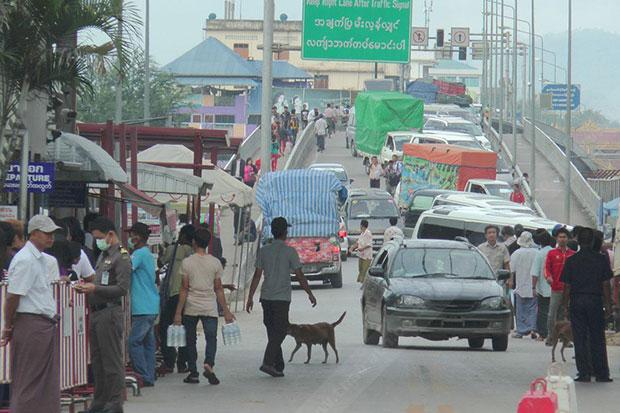Falling farm prices, currency hit Thai-Myanmar trade
TAK: Trade value across the border with Myanmar border in Mae Sot district dropped more than 10% last year on falling prices in the agricultural sector and a drop in the value of the kyat.
Suchart Triratwattana, the chief adviser of the Tak Chamber of Commerce, said on Wednesday border trade between the district and Myanmar’s Myawaddy township dropped from 90 billion baht in 2016 to 70 billion baht in 2017.
“Prices for crops in Myanmar fell sharply in the past year, and their economy relies on agriculture. Coupled with a currency that is losing purchasing power, the Myanmar people’s spending power has certainly weakened,” said Mr Suchart, who exports farm machinery.
Mr Suchart said he was not sure exactly why crop prices fell in Myanmar, but it was possibly caused by mismanagement.
Statistics from the customs office in Mae Sot showed the value of exports to Myanmar in the last quarter of last year was approximately 15.9 billion baht, down 14% or around 18.5 billion baht from the same period of 2016.
Imports rose 7.4% from 1.088 billion baht to 1.168 billion baht during the same period.
Mae Sot customs chief Wallop Wutipanich said Myanmar’s weakened purchasing power hit Thai exports. Of the top 25 products exported to Myanmar, luxury goods suffered the biggest decline in sales.
“We have seen that exports of whiskey, foreign alcoholic beverages, mobile phones, cotton clothes, and farm equipment dropped a lot during the past year. Myanmar’s economic outlook is not at its best at this time,” Mr Wallop said.
Exports still doing well are fuel, motorcycles and food-related products, which the Myanmar people still need, he said. Major imports from Myanmar are cattle, water buffalo, nuts and scrap metal.
The kyat has weakened against the baht. In December 2016, 10,000 Kyat bought 272 baht. The rate dropped to 241 baht in December 2017, according to currency traders in Mae Sot.


 Thailand
Thailand




